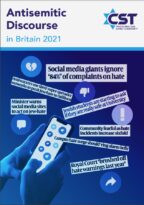Fonte:
https://cst.org.uk
Antisemitic Discourse in Britain 2021
Today, CST releases its Antisemitic Discourse Report 2021, a review of antisemitism in mainstream media and politics last year.
The report shows that antisemitism continued to play a role in the national discourse in Britain during 2021.
Discussion of antisemitism on university campuses revolved around the case of David Miller, Professor of Political Sociology at the University of Bristol. Miller made conspiratorial and implicitly threatening statements about Jewish students at Bristol. He was widely condemned, although hundreds of academics wrote a letter publicly supported Miller and his research. The university launched an investigation and Miller eventually lost his position
Antisemitic incidents on campus rose to their highest level, with a spike in May 2021 coinciding with the escalation in conflict between Israel and Hamas. The Education Secretary convened an antisemitism summit and continued to push for more universities to adopt the International Holocaust Remembrance Alliance (IHRA) definition of antisemitism. In January, the House of Lords held a debate about antisemitism on UK campuses, based partly on CST’s report on the subject released the previous December.
The huge rise in antisemitic hate incidents during the conflict between Israel and Hamas (both on and off campus) was condemned by politicians across the political spectrum. There were many statements expressing solidarity with the Jewish community
The Labour Party under the leadership of Sir Keir Starmer continued to take steps to eradicate antisemitism from the party. Four groups were proscribed by the party and delegates at the party’s annual conference voted to overhaul the independent complaints process. The Jewish Labour Movement conducted a survey of its members, which showed that a majority believed the Labour Party was a safe space for Jews under the current leadership.
Antisemitism continues to proliferate on social media platforms. A number of reports were released looking into the various platforms and their processes to deal with antisemitic content. The rap artist Wiley returned to some social media platforms to make more antisemitic statements before he was once again removed. Antisemitism is allegedly spread on social media by an extensive global disinformation network run by Iran.
Discourse about antisemitism played a role in the sporting arena. In football, there were examples of antisemitism in Scottish football, the word “holocaust” was misused and the rise and immediate fall of the European Super League led to antisemitic online comments. In cricket, it emerged that Azeem Rafiq, himself a victim of racism within the sport, had previously made antisemitic comments on Facebook. Rafiq apologised and underwent a process to learn about antisemitism, which received further media coverage.
Allegations of antisemitism were directed at the BBC after their report into an antisemitic attack on a bus containing Jews celebrating the festival of Chanukah claimed that one of the victims had made an alleged, but disputed, anti-Muslim slur.
Antisemitic discourse connected to the Covid-19 pandemic continued to play a role in 2021, with 78 antisemitic incidents recorded with Covid-related discourse. Some individuals in the Covid conspiracy movement deliberately utilised Holocaust imagery and terminology, trying to draw an equivalence between Covid restrictions and the treatment of Jews in Nazi Germany. This included wearing yellow stars or using Holocaust language on placards.


